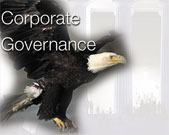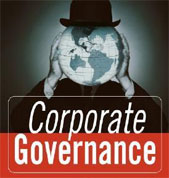Corporate Governance
1. PHILOSOPHY:
In line with the tradition of the company, the Board of Directors view their role as Trustees of the various stakeholders and the society at large and it is their endeavour to observe best governance practices.
2. MISSION:
The basic mission of the Company is to offer "Quality Consumer Products at affordable prices" and in the process delivering long-term value to all stakeholders in the Company.
3. VISION:
The Company envisions being a dominant global player in the field of agrochemicals, biopesticides and biotechnology based products. This shall be achieved through Customer Centric Processes, People Development, dedicated research work and operational excellence and shall occupy a place of pride in Agriculture and Biotechnology sector.
4. VALUES:
It is imperative that the entire organisation is aligned to the above Philosophy, Mission, Vision and Value statements so that conflicts are avoided and the purpose for which the Company is run is achieved.
5. ALIGNMENT:
The following General Code of Conduct has formally been adopted by the Board of Directors and notified to all employees to achieve this end. This Code is also published in the website of the Company for information of public and all employees of the Company.
6. CODE OF CONDUCT:
The following General Code of Conduct has formally been adopted by the Board of Directors and notified to all employees to achieve this end. This Code is also published in the website of the Company for information of public and all employees of the Company.
a. Applicability:
This Code of Conduct applies to all directors, senior management, heads of department, functional heads including branch heads and commercial managers. The persons to whom this Code is extended will be required to acknowledge the same in writing for adherence. The persons covered by this Code are hereinafter referred to as Officers.
b. Changes:
The Board is free to amend or alter this Code from time to time and such changes will be binding.
c. Terms in Appointment Letters/ Office manuals/circulars:
The letters of appointment and Office manuals/circulars do contain certain codes/obligations/workplace disciplines binding on the persons concerned. This Code supplements such appointment terms/manuals/circulars and may contain certain additional requirements and these are required to be observed mandatorily.
d. General Code:
This Code contains broader features and for any procedural detail or rules or clarifications the Corporate Affairs/Finance/HR departments can be contacted.
e. Trusteeship/Accountability:
Officers are entrusted with certain powers and authorities whether express or implied as also with Company’s finances, properties, equipments, documents and records. Such powers should be exercised for bonafide purposes in the interest of the Company. The finances and assets should be applied for the purposes of the Company and the Officers are accountable for all such finances, assets, documents etc that are under their respective control or possession and appropriate records should be maintained and reports and information submitted as per schedule or as and when required.
f. Personal and Professional Integrity:
Acting with a mindset of Trustee presumes high standards of personal and professional integrity in dealings with the Company and co-employees as well outside stakeholders. Officers are required to maintain such standards. Officers shall be honest and transparent in reporting the performance of their teams as well as their own performance. Integrity also calls for the ability to take ownership and acknowledge failures openly. As trustees, Officers are also expected to challenge and take action on any impropriety of conduct and business dealings. Some examples of unacceptable standards of personal and professional integrity are given here. For instance, non-furnishing of information though available, or furnishing an information knowingly that it is not true or not validated or not sharing or furnishing data or information amongst co-Officers and employees due to hierarchical issues or personal issues amounts to a substandard level of professional integrity. To give another example, the abuse of Company resources for personal gains or non-permitted personal use will constitute lack of personal integrity.
g. Conflict of Interest:
This arises when there is clash of interests of the Company and the personal interests of the Officer, which can lead to the Company’s interest being relegated to the second place or even sacrificed. This Code calls for avoidance of such situations, transparent disclosures when there is apparent or potential conflict of interest and meeting with arm’s length criteria if at all there are related party transactions. Some of such situations are described below:(i) Outside employment/contracts: Officers are full time employees and are expected to devote full attention to the business interests of the Company. Officers are prohibited from promoting or taking an active interest directly or through relatives in any business or profession outside the Company, which is in competition with the Company or which will strengthen or support a competitor or which will otherwise interfere with their performance or responsibilities to the Company. Officers must disclose to the Company any such interest, which may conflict with the business of the Company.
(ii) Dealings with Vendors/Suppliers: Officers are expected not to have any personal contracts or arrangements either directly or through their relatives with the vendors/suppliers/dealers/agents/consultants etc of the Company as the same can result in compromising Company’s interest while dealing with such parties on behalf of the Company. If there be any such contract or arrangement the same should be disclosed to the Company. This will also include accepting gifts and complements from such parties beyond the gift policy specified by the Company. The gift policy permits accepting diaries or customary standard corporate gifts distributed during festival times. Demanding or accepting inducements of any nature is totally prohibited. If any party offers any inducement the same shall be brought to the notice of the Company.
(iii) Related Party transactions: Officers are not expected to have any contract for purchase, sale, service or lease or agency with the Company. This applies to contracts through relatives or firms or entities in which the Officers or their relatives are interested. Any such contract should be disclosed to the Conduct Committee and cleared by the committee. However purchase of Company’s products at prices applicable to staff is outside the scope of this Code and does not require Conduct Committee’s clearance. The provisions of the Companies Act, 1956 or any statutory amendments thereof will govern transactions of directors with the Company.
(iv) Directorships in other companies:Officers are prohibited to get appointed on Boards of other companies, which are in competition with the Company’s business. Executive directors and Officers who are not directors on the Board of the Company are required to seek the clearance of the Company before accepting appointment as Director in other companies.
(v) Employment of Relatives:While the employment of relatives is discouraged, wherever required such employment is allowed on merits and on clearance by Conduct Committee. Employment of relatives in the same department is not encouraged as it can conflict with performance management systems. Employment of relatives of directors will be governed by the provisions of the Companies Act, 1956 or any statutory amendments thereof.
(vi) Other interests: There may be other situations not enumerated above which may have apparent or potential conflict of interest. Officers are expected to evaluate each such situation and if necessary discuss with the Corporate Affairs/Finance/HR departments of the Company and take necessary steps including disclosure or taking prior permission as the case may be.
For the purpose of this Code, the expression ‘Relative’ will mean and include spouse, parents, grand parents, children, brothers, sisters, aunts, uncles, nephews, nieces and in-laws.
h. General Behaviour:(i) Ethical and civilised conduct is required to be observed while working within the Company’s premises or Contractor’s premises or social events sponsored/organised/hosted/attended by the Company or while dealing with business clients, vendors, buyers and customers. Unethical or uncivilised conduct is understood as such behaviour, which is capable of bringing down the image or reputation of the Officer/Company.
(ii) The Company values honesty of intent and purpose in all the business transactions and the same shall be reflected by the Officers while transacting on behalf of the Company whether within the Company or with outsiders. This includes respecting all internal control systems, checks and balances, audit processes, quality systems, performance management systems, development initiatives as well as people (whether employees or outside professionals) who carry out such checks, balances, reviews, audits etc irrespective of their position in hierarchy and extending whole hearted adherence to such systems and processes.
(iii) The Company values a congenial work environment. All Officers are expected to work towards this end and shun incivility in word and deed and treat all employees with respect irrespective of their sex, caste, creed or hierarchy and ensure that there is no room for harassment on the basis of sex, caste, creed or hierarchy.i. Compliance with Laws:
The Company values compliance with all the laws, which are applicable to the Company and its business. Officers are expected to be familiar with the applicable laws in their respective area of work and ensure compliance with the same and in case of any doubt or clarification to get in touch with the Legal Department or the legal consultants usually engaged by the Company. Officers are required to certify to the Board of Directors compliance with applicable laws in their respective areas of operation and ensure maintenance of records for verification.
j. Trading in Company’s shares:
The Company’s shares are listed and the Officers who are privy to sensitive information which is still not made public are not expected to trade by themselves or through relatives in the Company’s shares till such information becomes public. The Company has in place certain Regulations in this respect and the Officers are required to follow the same and obtain prior clearance from the designated Officer (Director-Corporate Affairs) of the Company before buying or selling the Company’s shares in the market.
k. Disclosures/Communication:
The Company pursues a policy of appropriate timely disclosures and communication to its shareholders and compliance with the information and disclosure norms prescribed by SEBI. Officers are required to ensure that they furnish/observe all the internal information requirements and internal control processes keeping in mind that such information/compliance from them constitutes the basis for Company’s disclosures and financial reporting. No Officer shall communicate any financial or Company performance information or future plans to the media or other outsiders without having the same vetted by Corporate Affairs department.l. Confidentiality:
Officers are required to keep all the information relating to the Company’s business, processes, technology etc, confidential. Such information can be shared only with selective co-employees or contractors who need the same for discharge of their functions in relation to their engagement with the Company. Disclosure to any other party is prohibited except where the same is required to be disclosed under due process of law or disclosure requirements prescribed by regulatory bodies. This requirement will survive the expiry/termination of their service with the Company.
m. Political Contributions:
The Company does not associate or identify itself with any particular political party or outfit. Only the Board of Directors at their discretion may occasionally authorise political contributions as permitted by Law and no individual Officer can make any commitments in this regard.
7. Leadership Role of Officers:
The Company values the role of its Officers in achieving alignment of goals, fulfillment of the Company’s mission and realisation of the Company’s vision. The Company’s Corporate Governance policy states that excellence in Corporate Governance Practices can be achieved only if the spirit of Corporate Governance is followed right from the top management to the last level employee. Observance of this Code of Conduct in letter and spirit will automatically achieve this objective. This Code is primarily meant for the Officers to imbibe the same in their culture so that they become role models and leaders for the rest of the employees and enable the Company to achieve and maintain excellence in all its sphere of activities.
8. Breach of the Code of Conduct:
The Company values self-regulation and expects that the Officers will be role models and help in implementation of this Code. Any breach will be dealt with appropriately by the Conduct Committee depending on the severity of the breach. Action may range from mere warning to termination of appointment and recovery of loss caused to the Company as well as pursuing other options available under law.
9. Contact Points for Clarifications/Information:
The Code of Conduct prescribes certain disclosures to the Company as well as permissions from the Conduct Committee. All such disclosures and requests for permissions shall be submitted at Kilpest India limited, 7-C, Industrial Area, Govindpura, Bhopal.
Other Links
About Us:




 Go to top
Go to top